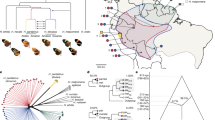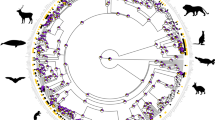Abstract
INDIVIDUALS are often assumed to behave so as to maximize their reproductive success1 but unambiguous determination of parentage is difficult, especially in species with complex social systems where a female may mate with several males and where there may also be intraspecific brood parasitism2,4. Even in apparently monogamous species, extra-pair paternity can be common5,7. DNA fingerprinting8,11 promises to revolutionize field studies by providing a powerful method for determining paternity and maternity12. Here we use this technique to link observations of mating behaviour and parental care with precise measurements of reproductive success. We show that in the dunnock Prunella modularis, a small passerine bird with a variable mating system13,14, males do not discriminate between their own young and those of another male in multiply-sired broods. Nevertheless, they increase their own reproductive success by feeding offspring in relation to their access to the female during the mating period, which is a good predictor of paternity.
This is a preview of subscription content, access via your institution
Access options
Subscribe to this journal
Receive 51 print issues and online access
$199.00 per year
only $3.90 per issue
Buy this article
- Purchase on Springer Link
- Instant access to full article PDF
Prices may be subject to local taxes which are calculated during checkout
Similar content being viewed by others
References
Clutton-Brock, T. H. (ed.) Reproductive Success. (Chicago University Press, 1988).
Brown, J. L. Helping and Communal Breeding in Birds: Ecology and Evolution. (Princeton University Press, 1987).
Wrege, P. H. & Emlen, S. T. Behavl Ecol. Sociobiol. 20, 153–160 (1987).
Koenig, W. D. & Mumme, R. L. Population Ecology of the Cooperatively Breeding Acorn Woodpecker, (Princeton University Press, 1987).
Sherman, P. W. & Morton, M. L. Behavl Ecol. Sociobiol. 22, 413–420 (1988).
Westneat, D. F. Anim. Behav. 35, 877–886 (1987).
Gowaty, P. A. & Karlin, A. A. Behavl Ecol. Sociobiol. 15, 91–95 (1984).
Jeffreys, A. J., Wilson, V. & Thein, S. L. Nature 314, 67–73 (1985).
Burke, T. & Bruford, M. W. Nature 327, 149–152 (1987).
Wetton, J. H., Carter, R. E., Parkin, D. T. & Walters, D. Nature 327, 147–149 (1987).
Burke, T. Trends Ecol. Evol. (in the press).
Brookfield, J. F. Y. I.M.A. J. math. appl. Med. Biol. (in the press).
Snow, B. & Snow, D. J. Yamashina Inst. Ornith. 14, 281–292 (1982).
Davies, N. B. & Lundberg, A. J. anim. Ecol. 53, 895–912 (1984).
Davies, N. B. Nature 302, 334–336 (1983).
Davies, N. B. Anim. Behav. 33, 628–648 (1985).
Jeffreys, A. J., Wilson, V., Thein, S. L., Weatherall, D. J. & Ponder, B. A. J. Am. J. hum. Genet. 39, 11–24 (1986).
Jeffreys, A. J., Wilson, V. & Thein, S. L. Nature 316, 76–79 (1985).
Jeffreys, A. J., Royle, N. J., Wilson, V. & Wong, Z., Nature 332, 278–281 (1988).
Jeffreys, A. J., Brookfield, J. F. Y. & Semeonoff, R. Nature 317, 818–819 (1985).
Hill, W. G. Nature 322, 290–291 (1986).
Davies, N. B. J. anim. Ecol. 55, 123–138 (1986).
Davies, N. B. & Houston, A. I. J. anim. Ecol. 55, 139–154 (1986).
Author information
Authors and Affiliations
Rights and permissions
About this article
Cite this article
Burke, T., Davies, N., Bruford, M. et al. Parental care and mating behaviour of polyandrous dunnocks Prunella modularis related to paternity by DNA fingerprinting. Nature 338, 249–251 (1989). https://doi.org/10.1038/338249a0
Received:
Accepted:
Issue Date:
DOI: https://doi.org/10.1038/338249a0
This article is cited by
-
Sex differences in avian parental care patterns vary across the breeding cycle
Nature Communications (2023)
-
Nestling odour modulates behavioural response in male, but not in female zebra finches
Scientific Reports (2021)
-
Reproductive coordination breeds success: the importance of the partnership in avian sperm biology
Behavioral Ecology and Sociobiology (2020)
-
Assessment of the dunnocks’ introduction to New Zealand using innate immune-gene diversity
Evolutionary Ecology (2020)
-
Extra-pair parentage and personality in a cooperatively breeding bird
Behavioral Ecology and Sociobiology (2018)
Comments
By submitting a comment you agree to abide by our Terms and Community Guidelines. If you find something abusive or that does not comply with our terms or guidelines please flag it as inappropriate.



